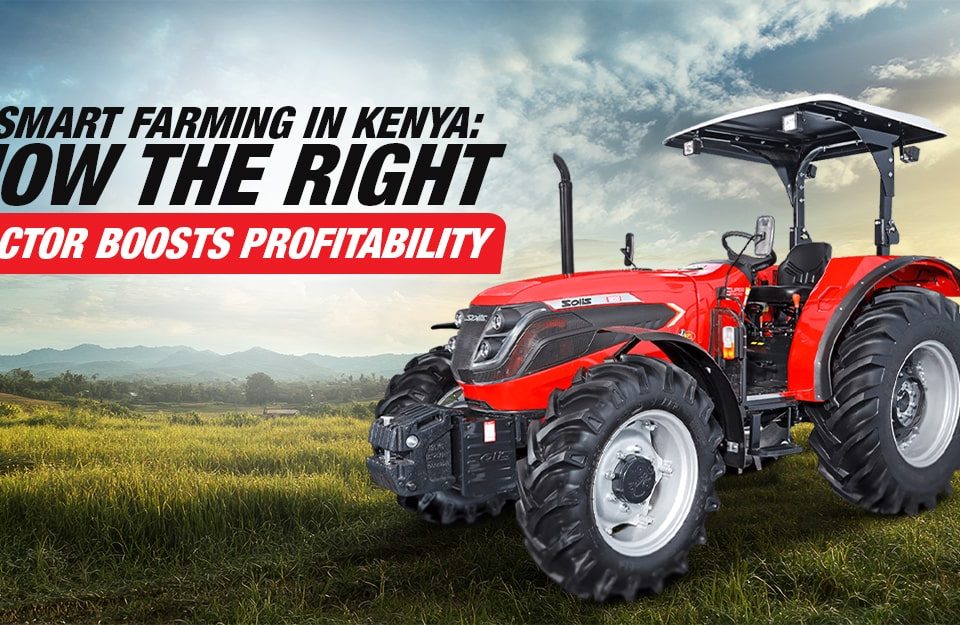How Solis Tractors Help Reduce Labor Costs on Kenyan Farms

Solis Tractor Buying Guide: Find the Perfect Model for Your Needs in Kenya
July 25, 2025
From Ploughing to Harvest: How Solis Tractors Power Every Stage of Farming in Kenya
August 18, 2025Labour is one of the greatest problems that farmers have to deal with in the Kenyan agricultural economy. As the wages increase with a shortage of skilled labour force and the demand to carry out work at the right time rises, the traditional way of agriculture is now not economically viable. As a solution, the trend among farmers is the mechanisation process, and Solis tractors have been proven to be one of the dependable answers. As a trade-off of performance, cost and multi-purpose, the Solis tractors ensure that there are fewer people to rely on, which reduces operational expenses and guarantees farm efficiency. This is how the Solis tractors are easing the burden on the Kenyan farmers when it comes to future costs in labour and changing the nature of their farming lives.
- Mechanisation of Labour-Intensive Tasks:-
Among the greatest benefits of applying the Solis tractors is that repetitive labour-intensive events such as ploughing, harrowing, sowing and spraying are now automatic. As a rule, such activities would demand the effort of a group of workers and a few days to be realised. A Solis tractor can do in a day or two what five labourers took a week to do. This sharp man-power pan can cause huge cost savings in payroll and working hours.
- Multi-Tasking Capabilities Reduce Need for Extra Hands:-
The Solis tractors can be equipped with a large selection of implements, including rotavators, seed drills, boom sprayers, trailers and front loaders. Such a versatile power enables one tractor to substitute for a number of manual processes. Such as tilling, mixing and levelling, which would have involved many workers and equipment, can also be done simultaneously with the rotavator. Consequently, there is no high demand for workers at every level of farming, which makes farmers work in teams.
- Time Efficiency Converts to Lower Daily Wages:-
Time is money in any farming environment, which is definitely true in times of peak farming seasons, such as in planting or harvesting. Solis tractors save a lot of time spent on fulfilling the necessary activities; thus, farmers will perform more work in a shorter period. Most of the agricultural workers get paid on a daily or weekly basis; thus, decreasing work time units leads to saving more money for a short-term worker. Better still, the fact that the timely implications of farming practices are met results in better crop production, hence a better harvest on investment.
- Reduced Reliance on Seasonal Labour:-
During the peak seasons, most Kenyan farmers encounter problems because the amount of labour required outweighs the amount demanded. Seasonal labour is also very affordable. Solis tractors assist in closing this gap since they offer constant mechanisation to the areas of instant need during the year, thus reducing the supply of seasonal labour. Using one tractor, a farmer will be able to plough, sow, fertilise the land, and carry the products, which were laborious processes before, as now they do not need to find temporary workers. This non-dependence on seasonal labour minimises stress as well as expense.
- Ease of Operation Reduces Need for Skilled Workers:-
Solis tractors are ergonomically configured with inbuilt controls, simplicity, ergonomic layout and simplified gear system, which makes it very easy to use even by a first-time user. This simplicity of operation does not require highly skilled or trained workers, who are usually highly paid. Family members or ordinary farm workers can drive and even use the tractor after minimal training, hence reducing the cost of highly skilled labour.
- Lower Maintenance Costs Mean More Savings Overall:-
Maintenance expenses may be very high to consume the savings as a result of the labour cost savings. Luckily, Solis tractors are designed using strong parts and high-maintenance systems, which help farmers maintain their running costs. Farmers save on reducing costs on repair and maintenance as there are fewer breakdowns and longer service life. This trustworthiness makes the kind of work on the farm get done smoothly without having to seek other farm workers to fill the gap of machines being out of order.
- Fuel Efficiency Reduces Operational Overheads:-
Another major expenditure in mechanical farming is fuel. With gas-efficient engines, Solis tractors guarantee maximum power delivery using fewer quantities of diesel. Such efficiency has a direct effect on the total running costs, inclusive of labour. A fuel-efficient tractor will do more work per litre of diesel, meaning that it will not have to operate for too long, and another assistance is not required, meaning that there is no extra cost to incur, and therefore, the indirect costs: labour and logistics costs are minimised.
- Increased Productivity Per Worker:-
The inclusion of Solis tractors into the daily functioning of farmers allows them to optimise the performance of the current workforce. As an example, where 10 workers will be used to plough a field by hand, the same workers can be better utilised in areas of irrigation, and the tractor can be used to do the ploughing. This is the level of efficiency in the optimal allocation of labour in the farm by minimising the wastage of the wage bill and time.
Conclusion:-
Finding a solution that will enable Kenyan farmers to reduce the amount of labour that they need, and also boost their productivity, is one thing, and the Solis tractor is giving the farmers in this farming-based economy the perfect solution to save their shillings and at the same time increase their productivity. Since it excludes manual work with an efficient mechanisation process and less dependency on talented employees and seasonal workforce, Solis tractors contribute to more affordable and expandable farming. Being built along with a large portfolio of models corresponding to various terrains and operations, Solis still leads Kenya to the new era of smart, efficient, and affordable down-to-earth farming.




